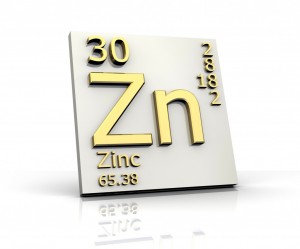Contributing Writer for Wake Up World
All the “advances” in modern technology, and the emphasis on industrial efficiency and lower costs, but not on quality of food, has put yet another serious aspect of mineral deficiency into the spotlight. Conventional farming methods that rely heavily on chemical fertilizers and pesticides, which deplete the soil of nutrients, along with processed foods and many other factors discussed below, all contribute to a poor absorption rate of an essential mineral: ZINC!
Hybrid crops produce more food per acre, but this means that each stalk of wheat or corn or vegetables has much less zinc than in earlier times when hybrids were not used. Zinc and other trace elements are removed when wheat, rice, corn, sugar and even salt are refined.
Some foods, especially frozen vegetables and perhaps meats, are sprayed with EDTA to retain their color and this chemical removes some of the zinc and chromium from the food.
[pro_ad_display_adzone id=”110028″]
Most babies are born low in zinc. This is because their mothers tends to be low in zinc, so the babies do not obtain enough in utero. Vegetarian or near vegetarian diets are much lower in zinc. Stress depletes zinc very quickly, at times in minutes. An excess amount of calcium in your diet will also decrease absorption, as will weight loss, surgery, and alcohol.
“Special times in life require more zinc. This includes, childhood, puberty, pregnancy, breast feeding, and old age. Any stressful situation, during infections, and the presence of chronic illness will also require more zinc in the diet. For example, diabetics need much more zinc. Also, low zinc in boys around the age of puberty is one reason they do not grow tall as fast as the girls at that age. Later, the boys catch up, but the boys are using their inadequate zinc to develop the prostate gland and testicles, and there is insufficient zinc to enable them to grow taller at that age, in many cases. This is so common it is considered normal today.” ~ Lawrence Wilson, MD
Why And Where Is ZINC Needed?
Zinc is required for hundreds of enzymes that control functions as diverse as one’s eyesight, hearing, health of the skin, hair, nails, connective tissue, sexual function, digestion, immune response, vision and more. Zinc is necessary for optimal growth and development in children, is needed to release vitamin A from the liver, for metabolism of fats, carbs, proteins, for the body’s own primary antioxidant ( “SOD” – super oxide dismutase enzyme), to heal wounds, eradicate infections and it is also important for synthesis of DNA and RNA. It is also required to rebuild the fast-growing intestinal tissue, and for the production of bile, and liver and pancreatic secretions.
The retina of the eye is one of the richest tissues in zinc in the human body and one of the tissues most dependent on zinc, along with the male prostate gland and the intestines. Zinc is also thought to be a calming neurotransmitter in its own right. It is required for higher mental functioning and for mental development of the neocortex or new brain.
Symptoms of zinc problems include hyperactivity, ADHD, anxiety, irritability, nervousness, emotional instability, mood swings, bipolar disorder and many other mental and emotional symptoms. Zinc and copper are maintained in a delicate balance. Many menstrual irregularities such as PMS are related to imbalances in this area.
How Do We Boost Absorption of ZINC?
Only about 30% of the zinc that we get from food and supplements is absorbed. Common contributing factors are malabsorption problems, inefficient digestion and low levels of enzymes (which are zinc-dependent, by the way).
Zinc found in animal foods is better absorbed than the one from plant sources. Some of the foods high in zinc are red meat, oysters, crab, liver, chicken hearts and raw cheese, so it is wise to incorporate these into your diet.
Soaking and sprouting grains and nuts is so important, since this reduces the phytic acid content, which interferes with mineral absorption, including zinc.
Oxalates found in deep green leafy veggies and soybeans decreases zinc absorption as well. Moderation is the key for the green leafy veggies and as far as soybeans it’s best to avoid them completely, in my opinion.
Zinc and Copper Toxicity
Zinc and copper are antagonists. While zinc toxicity is possible, far more common is zinc deficiency and copper toxicity. Whenever zinc becomes deficient, copper tends to accumulate. Copper is an essential trace element serving many important functions as well. However, copper is well documented to induce several toxic effects in the body, when elevated. Because copper is a pro-oxidant, when free and unbound, it can quickly generate free radicals.
Problems associated with copper toxicity include: miscarriages, infertility, estrogen dominance, anemia, schizophrenia, depression, anxiety disorder, arthritis, chronic fatigue, migraines, liver toxicity, thyroid conditions, chronic candida yeast infections, PMS.
The major sources for copper toxicity are: exposure to industrial forms of copper such as copper pipes, copper cookware, birth control, exposure to copper-based fungicides, other mineral deficiencies (manganese, iron, selenium, chromium), and vitamin deficiencies (B-vitamins and vitamin C). Diets high in copper and low in zinc may play a role in copper toxicity as well, as do adrenal weakness and liver toxicity.
Detecting Zinc Related Problems With Hair Tissue Mineral Analysis
There are several ways to assess zinc status in the body. Serum blood tests are useless, in general, as zinc does not accumulate in the blood serum. White blood cell zinc levels to assess total body zinc is also not too reliable. Assessing zinc using analysis of urine and feces are not considered reliable either, because they depend too much on the last day’s meals and other factors such as absorption of dietary zinc.
Dr. Paul Eck, a brilliant biochemist, found that the sodium/potassium ratio on a properly performed hair mineral analysis is the best way to assess the need for zinc.
The Hair Tissue Mineral Analysis is a very easy, accurate and quite inexpensive way to determine if you are or not zinc deficient, cooper toxic and if you accumulate heavy metals in your body.
Why is detection of heavy metals important? Heavy metals accumulate in vital tissues (brain, bone, liver, etc), disrupt organ function, displace nutritional minerals from sites of biological activity, disrupt enzymatic activity and create biochemical imbalance.
Hair Tissue Mineral Analysis requires specialized, extensive training for interpretation of results. Strange as it may seem, the right protocol often doesn’t include direct administration of the mineral with a low level. Rather, another mineral, whose known effect is to elevate that mineral is given. There are even instances when administering a mineral already known to be low, will result of further lowering of that mineral.
For example, an important property of zinc is that it lowers sodium levels. So, if zinc and sodium are both low, particularly if there is a sodium/ potassium inversion and if zinc is given with the expectation of raising zinc levels, the body may actually lower zinc levels further, to allow sodium to elevate back to a normal range. This is because the sodium / potassium ratio is so critical to homeostasis. The body will try to correct that imbalance before it addresses the zinc deficiency.
Such particularities can only be detected through a real interpretation of the hair tissue mineral analysis and by knowing the Metabolic Type of the person, in order to determine the best supplementation protocol and diet.
Article sources:
- http://drlwilson.com/Articles/ZINC
- http://drlwilson.com/articles/copper_toxicity_syndrome
- http://www.metabolichealing.com/michael-s-blog/zinc-and-copper-imbalances-immense-biochemical-implications
- The Healthexcel System Of Metabolic Typing
Recommended articles by Raluca Schachter:
- Vitamin D Supplementation: This is Why It Can Be Wrong
- Hypothyroidism or Hashimoto’s? What You Need to Know and Why It Matters
- Understanding Cannabis Oil
- 6 Steps to Solve Your Blood Sugar Problems Permanently
- Antibiotic Resistant Infections: The Dangers… and How You Can Avoid Them
- What Really Happens When You Take Antibiotics?
- Understanding Inflammation and How to Eliminate It Naturally
- Listen to Your Body. Correct Food Ratios. Reverse Disease.
- Cholesterol Myths Debunked
- Follow The Money In “Sick-Care”: What’s Behind The Drugs And Needles?
- What Happens In Your Body When You Suffer From Thyroid Disease?
About the author:
 Raluca Schachter is a dedicated Clinical Nutritionist / Natural Health Practitioner a.k.a “The Health Detective”. Raluca was able to naturally reverse chronic health conditions she was struggling with most of her life, and now uses her knowledge to help as many people as possible do the same. Her health programs and diet plans offer a very unique and comprehensive approach to health, where individual nutritional and biochemical requirements are firstly met using specific nutrients and foods that each metabolism thrives on. Raluca offers her services to international clientele and her practice is fully online based. You can connect with Raluca at www.metabolicenergy.net and https://www.facebook.com/raluca.schachter.metabolicenergy
Raluca Schachter is a dedicated Clinical Nutritionist / Natural Health Practitioner a.k.a “The Health Detective”. Raluca was able to naturally reverse chronic health conditions she was struggling with most of her life, and now uses her knowledge to help as many people as possible do the same. Her health programs and diet plans offer a very unique and comprehensive approach to health, where individual nutritional and biochemical requirements are firstly met using specific nutrients and foods that each metabolism thrives on. Raluca offers her services to international clientele and her practice is fully online based. You can connect with Raluca at www.metabolicenergy.net and https://www.facebook.com/raluca.schachter.metabolicenergy
[pro_ad_display_adzone id=”110027″]







